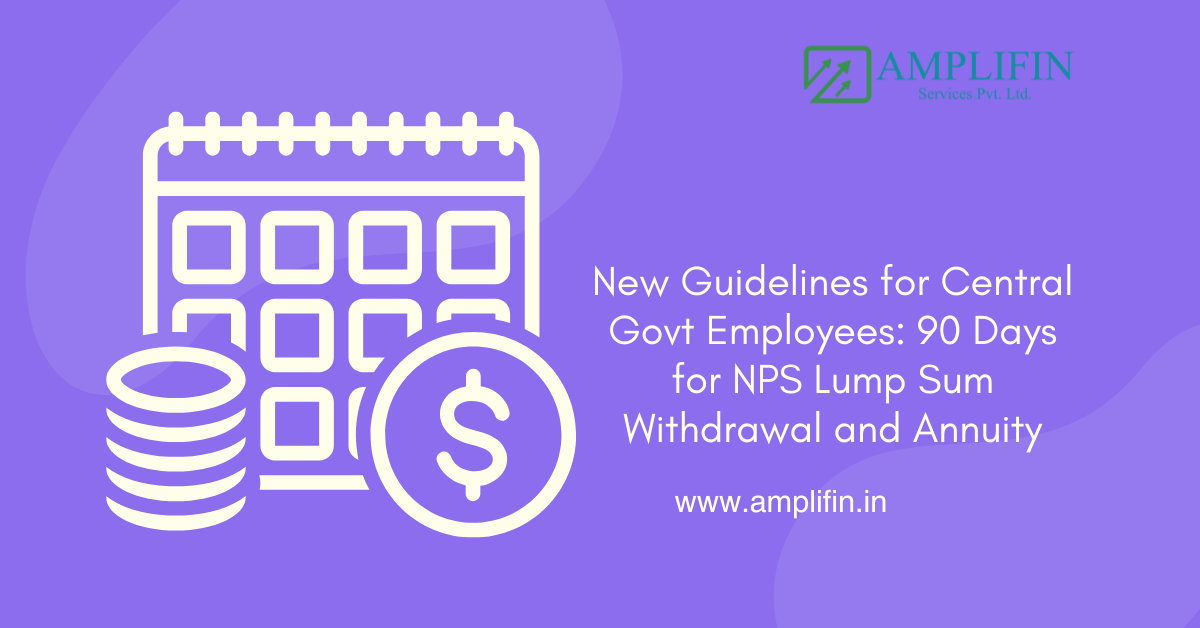New Guidelines for Central Govt Employees: 90 Days for NPS Lump Sum Withdrawal and Annuity
The National Pension System (NPS) has become a vital part of retirement planning for central government employees. Under recent guidelines, central govt employees who retire or resign will now have to wait for 90 days for their NPS lump sum withdrawal and annuity payments. This article discusses the new rules, how they impact employees, and the steps needed to ensure a smooth transition into retirement. Whether you’re a current employee or nearing retirement, understanding these guidelines is essential for proper financial planning.

New NPS Rules and Their Impact on Central Govt Employees
The central government has introduced new NPS rules that directly affect government employees. These new guidelines, issued in 2024, aim to streamline the lump sum withdrawal and annuity process. Central govt employees, upon retirement or resignation, will have to wait for 90 days for their NPS lump sum withdrawal. This means that the accumulated pension corpus will not be immediately accessible, and employees will have to plan accordingly.
The National Pension System (NPS) has been one of the most widely used retirement savings schemes among central government employees. With these updated regulations, the government seeks to ensure the smooth processing of withdrawals and payments, but employees will have to wait for 90 days to receive their full lump sum. The new rules are a part of a larger regulatory framework that aims to enhance transparency and improve the financial security of retired employees.
Lump Sum Withdrawal and Annuity on Resignation or Retirement
For central govt employees, the NPS allows a lump sum withdrawal upon resignation or retirement. According to the new NPS rules, employees will now face a waiting period of 90 days for NPS lump sum withdrawal and annuity payments. This change impacts both the lump sum withdrawal and annuity options that employees are entitled to upon exiting service. The guidelines specify that employees will have to wait for 90 days before they can access their NPS funds. This delay is intended to provide sufficient time for all necessary documentation and processes to be completed, ensuring that payments are accurate and timely.
The new NPS rules for central govt employees also offer provisions for the annuity part of the pension. A portion of the NPS funds is allocated toward an annuity, which provides a regular monthly pension to retirees. With these changes, employees need to carefully plan their finances, as the 90-day waiting period may require them to adjust their immediate post-retirement financial strategies.
Employee Service and NPS Lump Sum Withdrawal: What to Know
Understanding how the new guidelines affect your NPS withdrawals is crucial for effective retirement planning. Central govt employees who have served the government for years may rely heavily on their NPS savings as part of their retirement income. However, the new NPS rules, which require employees to wait for 90 days for NPS lump sum withdrawal, mean that immediate access to these funds is delayed.
This change is significant for employees planning their retirement finances. While the 90-day wait may seem long, it is designed to ensure the accuracy and completeness of the lump sum withdrawal process. The central government has taken steps to streamline the process and ensure that all necessary documentation is processed within this time frame.
Additionally, the National Pension System offers flexibility in how the lump sum can be withdrawn. Central govt employees can withdraw up to 60% of their NPS account balance as a lump sum, with the remaining amount going toward an annuity that provides regular pension payments. The waiting period applies to both the lump sum and the annuity payments, so employees need to plan for this when setting their retirement budgets.
Why Employees Will Have to Wait for 90 Days for NPS Lump Sum
The 90-day wait period for NPS lump sum withdrawals may seem inconvenient, but it serves an important purpose. The central government introduced this waiting period to ensure that all processes related to NPS withdrawals are properly completed. This includes the verification of documents, the calculation of the exact lump sum, and the allocation of funds for the annuity portion.
Central govt employees who are planning to retire or resign must factor in this waiting period when planning their finances. The 90 days for NPS lump sum withdrawal may delay the availability of a portion of your retirement income, but it ensures that the process is handled efficiently and without errors. The government has also introduced measures to ensure that employees receive their lump sum and annuity payments as soon as the waiting period ends.
The waiting period is part of the new guidelines issued by the central government in 2024 and is aimed at improving the overall service and reliability of the NPS. Employees will have to wait, but the process ensures that their pension payments are secure and free from errors.
Case Study: Central Govt Employees and NPS Withdrawal in 2024
To better understand the impact of the new NPS rules, let’s consider a case study of a central govt employee retiring in 2024. This employee, having served for 35 years, has accumulated a significant pension corpus under the National Pension System. Upon retirement, they are entitled to withdraw 60% of their NPS balance as a lump sum, while the remaining 40% will be allocated toward an annuity.
According to the new guidelines, this employee will have to wait for 90 days for their NPS lump sum withdrawal and annuity payments. The 90 days for NPS lump sum withdrawal provides sufficient time for the verification of documents and the accurate calculation of both the lump sum and annuity amounts.
During this waiting period, the employee can still access other forms of retirement income, such as gratuity or provident fund savings. However, they will need to plan for the delay in receiving their NPS funds, which can be a significant portion of their post-retirement income. This case highlights the importance of financial planning and understanding the new NPS rules for central govt employees.
Central Govt Employees: Financial Planning for NPS Lump Sum Withdrawal
Given the new guidelines, financial planning for central govt employees becomes even more important. With the 90-day waiting period in place, employees need to consider how this delay will impact their overall retirement income. The NPS provides a crucial source of retirement savings, and employees should plan ahead to ensure they have sufficient funds to cover the waiting period.
Employees should also explore other savings options, such as gratuity, provident fund, and personal savings, to ensure they have enough liquidity during the 90-day waiting period. Additionally, employees can consult financial advisors to better understand how to allocate their retirement savings in light of the new guidelines.
The central government has introduced these new NPS rules to improve the overall process for lump sum withdrawal and annuity payments. By planning ahead and understanding these changes, employees can better manage their retirement income and avoid any potential financial difficulties during the waiting period.
Summary of Key Points to Remember
- 90-Day Waiting Period: Central govt employees will have to wait for 90 days for NPS lump sum withdrawal and annuity payments under the new guidelines.
- Lump Sum Withdrawal and Annuity: Upon retirement or resignation, employees can withdraw up to 60% of their NPS balance as a lump sum, while the remaining 40% will go toward an annuity.
- Financial Planning: Employees should plan their retirement finances to account for the 90-day waiting period, ensuring they have sufficient funds to cover this period.
- New Guidelines: The new rules, introduced in 2024, aim to streamline the NPS withdrawal process while ensuring accuracy and transparency.
- Impact on Retirement Income: The delay in receiving the NPS lump sum may impact employees’ immediate retirement plans, but the process ensures secure and reliable payments.
By understanding and adapting to these new NPS rules, central govt employees can make informed decisions about their retirement finances, ensuring a smooth transition into this new phase of life.
